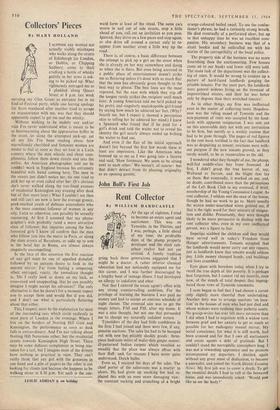John Bull's First Job
Rent Collector
By WILLIAM HARDCASTLE
• AT the age of eighteen, I tried to become an estate agent and 4- ) auctioneer. This was on
Not that I entered the estate agent's office with any strong countervailing ambition. For the privilege of learning the business I was paid no money and had to accept an onerous schedule of night classes. The eventual aim was to get the magic letters, FAI and FSI, after my name. It was a nice thought, but not one that persuaded me to change my naturally indolent nature.
Tynesiders of the day had little confidence in the firm I had joined and there were few, if any, genuine auctions. The sales list had to be bumped out with new but pitiably shoddy goods: three- piece bedroom suites of wafer-thin ginger veneer; ill-patterned Indian carpets which moulted so steadily that the place was always afloat with their fluff; and, for reasons I have never quite understood, Dutch bulbs.
Even so, I enjoyed the days of the sales. The chief porter of the salesroom was a martyr to ulcers. He, had given up smoking but had re- placed this with an even more damaging vice: the constant sucking and crunching of a bright orange-coloured boiled sweet. To use the confec- tioner's phrase, he had a curiously strong breath. He died eventually of a perforated ulcer, but up to that unhappy time he was an excellent com- panion. His secondary business was that of a street bookie and he enthralled me with his stories of the corruptibility of the local police.
The property side of the business was no more flourishing than the auctioneering. Few houses came on to our books and fewer still were sold. The main task of the department was the collect- ing of rents. It would be wrong tq conjure up a picture of hard-faced landlords gouging the pitiable tenants. For the most part, the landlords were genteel widows living on the remnant of impoverished estates, and their lot was better only by degrees than their wretched tenants'.
As in other things, my firm was ineffectual even in the matter of collecting rents. Hopeless- ness was the ruling mood of Tyneside and the non-payment of rents was accepted by the land- lords with apparent resignation. I was sent out on this unenviable duty not with any instruction to be firm, but merely as a weekly routine that had to be gone through. The pages of red figures in the rent book testified to the fact that landlord was as despairing as tenant; evictions were with- out purpose if the new tenants proved, as they surely would, to be as resourceless as the old.
I wondered what they thought of me, the plump, well-fed middle-class boy from Jesmond. At first, I didn't grasp the true horror of, say, Wallsend or Jarrow, and the blight that lay on them. But eventually, it worked on me, and, no doubt, contributed more than the persuasions of the Left Book Club to my eventual, if brief, membership of the Young Communist League. As - rent collector, I seldom met the man of the house, though he had no work to go to. More usually the waxen under-nourished wives greeted me, if that is the right word for their mixture of resigna- tion and dislike. Presumably, they were thought likely to be more persuasive in dealing with the rent collector who, even in my own ineffectual person, was a figure to fear.
Impetigo scabbed the children and they would have served well in today's Freedom from Hunger advertisements. Tenants accepted that the landlords would never carry out any repairs, just as landlords knew that tenants would seldom pay. Little money changed hands, and buildings and lives crumbled.
• Eyes glaze with boredom today when I try to recall the true depth of this poverty. It is perhaps best forgotten, but I cannot rid my nostrils, even now, of the stench of total despair that impreg- nated those rows of Tyneside tenements.
I soon began to feel that I had chosen a career only slightly more cheerful than undertaking. Another duty was to arrange auctions 'on loca- tion' in the houses of men who had just died and whose widows were realising tbeir pathetic assets. No gossip-writer has ever felt more intrusive than I did when I had to negotiate with a widow torn between grief and her anxiety to get as much as possible for her mahogany mantel mirror. My social conscience, for what it is still worth, had been aroused and for that I owe all auctioneers and estate agents a debt of gratitude. But I couldn't stand the necrophilic atmosphere long. I was not a rewarding apprentice and no protests accompanied my departure. I decided, again without any great sense of dedication, to become a journalist, and joined the North Shields Evening News. My first job was to cover a death. To get the essential details I had to call at the bereaved home, and was immediately asked: 'Would you like to see the body?'






























 Previous page
Previous page